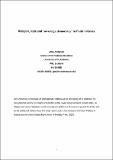Files in this item
Religion, state and ‘sovereign democracy’ in Putin’s Russia
Item metadata
| dc.contributor.author | Anderson, John Philip | |
| dc.date.accessioned | 2018-01-02T00:31:57Z | |
| dc.date.available | 2018-01-02T00:31:57Z | |
| dc.date.issued | 2016-07-01 | |
| dc.identifier | 242104119 | |
| dc.identifier | fc2a48cc-75a9-4577-b72c-6b8cc46def52 | |
| dc.identifier | 000383992200008 | |
| dc.identifier.citation | Anderson , J P 2016 , ' Religion, state and ‘sovereign democracy’ in Putin’s Russia ' , Journal of Religious and Political Practice , vol. 2 , no. 2 , pp. 249-266 . https://doi.org/10.1080/20566093.2016.1181360 | en |
| dc.identifier.issn | 2056-6093 | |
| dc.identifier.other | ORCID: /0000-0003-0682-3780/work/76387308 | |
| dc.identifier.uri | https://hdl.handle.net/10023/12406 | |
| dc.description.abstract | This article explores the role of the dominant Russian Orthodox Church in the evolution of the post-communist Russian Federation. This is not a classic case where religion may have contributed to the democratisation of society because this has not been a primary goal of political elites, and the regime that has emerged might best be described as ‘hybrid’ with growing authoritarian tendencies. Having played little role in the ending of communism, having little historical experience of working within a democracy, suspicious of liberal-individualist visions of public life and committed to a vision of its role as the hegemonic religious institution, the promotion of democratic governance has not been a priority of church leaders. At the same time the political structures created by the Kremlin encourage a degree of conformity and support for the regime by key social actors, and in the wake of the political crisis of 2011-12 there have been further incentives for church and state to work more closely together. For the state, the church offers indirectly a constituency of political support; for the church, a more needy state has been prepared to promote at least part of its socially conservative agenda. In this context, neither is much concerned about democratic governance. | |
| dc.format.extent | 18 | |
| dc.format.extent | 443297 | |
| dc.language.iso | eng | |
| dc.relation.ispartof | Journal of Religious and Political Practice | en |
| dc.subject | Russia | en |
| dc.subject | Religion | en |
| dc.subject | Orthodoxy | en |
| dc.subject | Democracy | en |
| dc.subject | Putin | en |
| dc.subject | BL Religion | en |
| dc.subject | JZ International relations | en |
| dc.subject | SDG 16 - Peace, Justice and Strong Institutions | en |
| dc.subject.lcc | BL | en |
| dc.subject.lcc | JZ | en |
| dc.title | Religion, state and ‘sovereign democracy’ in Putin’s Russia | en |
| dc.type | Journal article | en |
| dc.contributor.institution | University of St Andrews. School of International Relations | en |
| dc.identifier.doi | 10.1080/20566093.2016.1181360 | |
| dc.description.status | Peer reviewed | en |
| dc.date.embargoedUntil | 2018-01-01 |
This item appears in the following Collection(s)
Items in the St Andrews Research Repository are protected by copyright, with all rights reserved, unless otherwise indicated.

